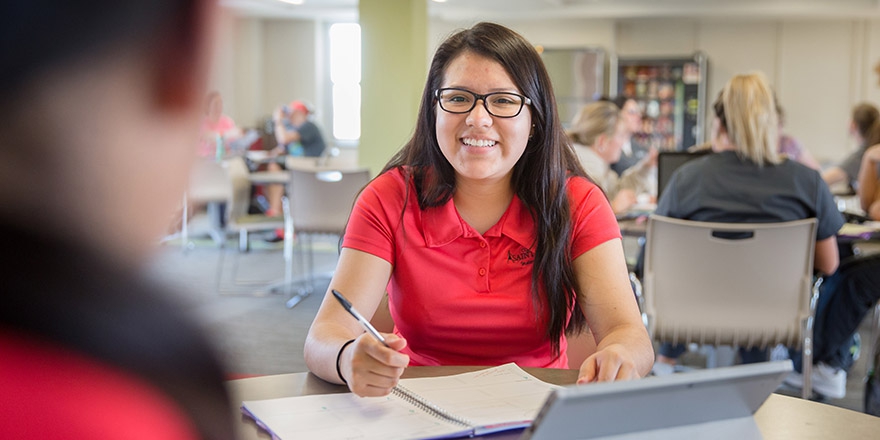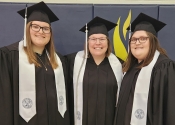
Young, undocumented immigrants can't get federal aid, so UNO and College of St. Mary are quietly helping cover cost of degree
Omaha World-Herald, March 29, 2016
By Kate Howard / World-Herald staff writer
When Dania Cervantes was choosing a college, she had a résumé full of extracurriculars, a transcript packed with Advanced Placement courses and a second-in-her-class ranking at Nebraska’s largest high school.
The Omaha South High grad was the kind of student who could have her pick of the colleges courting her with scholarships and aid offers.
But her class rank and ACT score mattered a lot less than her lack of U.S. citizenship.
Cervantes, who was born in Mexico and came to the United States with her parents at age 6, can’t apply for federal aid or loans.
But Cervantes, 19, is enrolled in nursing school through a scholarship that the College of St. Mary has offered for a decade. It covers tuition, room and board for as many undocumented women as the college’s donors will support each year.
“If I didn’t get this scholarship, there is no way my parents could afford college for me,” said Cervantes, a freshman.
Cervantes is one of the young people often referred to as “Dreamers,” those who were brought illegally into the United States as children by undocumented parents.
The Deferred Action for Childhood Arrivals program, or DACA, has given such immigrants a promise that they won’t face deportation and will have a path to legal work. But they still don’t qualify for federal or state financial aid to help pay for college.
Two Nebraska colleges have recognized the need and quietly set up private endowments to provide scholarships. Other colleges are considering doing the same.
At the College of St. Mary, 28 students have graduated via the program over the last 10 years.
The University of Nebraska at Omaha launched a scholarship for Dreamers this year through a private donation.
And the University of Nebraska at Kearney hopes to follow suit.
The Susan T. Buffett scholarship, which covers tuition and fees at any public Nebraska college or university, is not specifically for undocumented students, but they are eligible for it.
Without private aid, many of the students would find a college education out of reach.
Undocumented students who graduate from Nebraska high schools can pay the in-state rate of tuition at public colleges. But that cost is still often out of reach, because state law bars them from receiving state aid.
It’s rare for students to pay full sticker price for college. But undocumented students aren’t eligible for the typical tuition discounts, merit scholarships and need-based aid available to their U.S. citizen peers because the ban extends to scholarships sponsored by state-funded institutions.
With college options limited to the places they can pay for out-of-pocket, the Dreamers are more likely to enroll in community college than a state university or a private college.
Even then, it’s a long road, said Zenen Jaimes Perez, a policy analyst with United We Dream, an advocacy group for immigrant youths based in Washington, D.C. Undocumented students generally take seven to eight years to complete a four-year degree, Jaimes Perez said.
“We try to encourage colleges and universities to look at what they have available, so we can see more students able to take advantage of it,” Jaimes Perez said. “I do think there is more that public institutions could be doing to be opening up resources for undocumented students.”
The University of Nebraska-Lincoln doesn’t have a scholarship program for undocumented students. The state colleges don’t either.
Providing help to Dreamer students is not without controversy.
Nebraska — after overriding a veto by Gov. Pete Ricketts — last year became the last state nationally to let DACA recipients get driver’s licenses.
The law allowing them to pay in-state tuition — enacted over then-Gov. Dave Heineman’s veto in 2006 — has survived repeal attempts since then.
College of St. Mary President Maryanne Stevens said she hasn’t felt much backlash from offering the scholarships, although she does hear occasionally from those who disagree.
“If I stood up from the housetops and say we do this, people would say, ‘You’re doing it because you’re a bleeding heart.’ That’s not the issue,” she said.
The issue, she said, is need:
“This is the group of people growing in our community. We would have people who wouldn’t be using their potential.”
At College of St. Mary, 27 women are now enrolled in the program, called Misericordia — Latin for mercy.
They are eligible with or without DACA status. The students must get involved on campus, join at least one club and maintain a 2.0 GPA. They must purchase their own books and must contribute up to $2,000 each year toward their education.
Two graduates of the program now work at the college, after having become permanent residents, including Daniela Rojas, who graduated last year. She said most of her high school friends who were undocumented like her went to community college — or skipped college for work in factories or day labor.
If she hadn’t received the scholarship at St. Mary, she said, she was considering returning to her home country, Colombia.
“There are so many people who are discouraged because they don’t have a paper that says, ‘Go ahead and do it,’ ” Rojas said.
Support is strong among a growing cadre of donors to the program, including Deb Macdonald of Omaha, who is retired from the energy industry.
Macdonald said some friends disagree with her, but she thinks the recipients are good kids who deserve a chance.
“Just because we’ve failed to really resolve this immigration problem, I don’t think they should bear the brunt of that fact,” she said.
When scholarship money isn’t available, students often pay out of pocket as they go.
That’s a scenario that Mary Sommers, the University of Nebraska at Kearney’s financial aid director, said she usually sees in only two populations: students from wealthy families or undocumented students of limited means.
“If a student doesn’t have a regular, consistent source of funding and their family is not able to fully fund tuition fees, they often will start, stop, start and stop,” she said.
Do they graduate? Sommers said she’s not sure because UNK doesn’t track them. But she hopes the college will be able to establish a scholarship similar to UNO’s.
UNO’s program was started by an anonymous donor. This year, 22 students were awarded the inaugural Dreamer’s Pathway scholarship, which covers full tuition and fees.
Neither the College of St. Mary nor UNO advertises the scholarships, relying instead of word of mouth and targeted recruiting.
At UNO, the offer is limited to graduates of Omaha metro area high schools with DACA status.
Jonathan Benjamin-Alvarado, assistant vice chancellor for student affairs at UNO, said his office identified 150 eligible students and invited them to apply. Those who got the scholarships are very high-achieving, he said, and almost all have asked what they can do to give back.
“The return on investment will be really meaningful for the state of Nebraska,” he said. “These are young people who all said, ‘Omaha is my home. I don’t know Mexico, I don’t know Guatemala, this is what I know. And I want to be a professional here, raise a family here.’ ”
* * *
What is DACA, or Deferred Action for Childhood Arrivals?
President Barack Obama’s executive action, taken in 2012, provides temporary lawful status to people who were brought to this country illegally as children.
To be eligible, an applicant must have come to the U.S. before turning 16; must have lived here since June 2007; must have no significant convictions; must be in school or have graduated or obtained a GED; and must have been under age 31 when DACA was created.
As of late last year, the program has granted more than 720,000 people permission to live and work legally in the United States.
It has been controversial. Opponents especially criticize Obama for bypassing Congress. Because DACA was begun via executive order, it’s unclear whether a new administration would continue the program; every Republican presidential candidate has said he would end deportation-relief programs.
Can undocumented people enroll in college?
Yes. Immigration status is not part of a college application. But a Social Security number, or DACA number, is necessary to fill out the Free Application for Federal Student Aid, the first step in getting almost any financial aid.
Undocumented students, even with DACA status, are not eligible for federal financial aid or loans.
Can undocumented students pay in-state tuition in Nebraska?
Yes. Nebraska is one of at least 20 states that allow undocumented college students who meet certain requirements to pay the lower in-state rates at public schools, according to the National Conference of State Legislatures. But the state bars those students from receiving state aid. In Nebraska, undocumented students — with or without DACA — cannot get state grants or scholarships from public universities.
At least five states — California, New Mexico, Minnesota, Texas and Washington — offer state financial aid to undocumented students.











